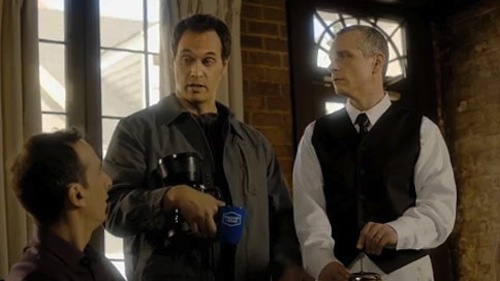The best part of dogsitting Stringer is watching TV, and the best part of watching TV is seeing commercials. Neither of those statements is what rhetoricians call “true,” but my ad consumption is way up over the last week anyway, probably as a consequence of my inability to work the DVR. Don’t cry for me, because finally I can access the fundamental function of advertising: telling me what’s real. If, like me, you were 14 years old when “alternative” became the most popular genre of music, you know that large portions of American culture are fake. The mainstream is a powerful if misguided force, and it is up to us rugged individuals to discern what is authentic from trends, pretensions, corporate drones and simulacra. And we have nothing to go by besides A) our visceral intuition of the sublime and B) Maxwell House commercials. Video after the jump.
httpv://www.youtube.com/watch?v=xpC39-yITdA
“Stay Grounded,” the Brechtian overlay urges us—a play on the coffee grounds in the decent and unpretentious Maxwell House, so unlike the French press, which also uses ground coffee. But no matter! That thing is weird, with its plunger and whatnot, and it represents a culture that has lost its way. “Don’t get me wrong; I love the French,” says brunch interruptor Ted, with a perfectly calculated pause at the :06 mark. It is possible Ted does not actually love France.
It is possible that the French—like the waiter with a tie and the urban-chic exposed brick and the press that bears their name—are Totally Fake. Such things are enjoyed in overwhelming numbers by people who think they’re so great, e.g. the woman whom Ted stops addressing at :08 and who sits with her hands clasped for the rest of the commercial. We real people must simply put up with them. Or we can take a bold stand by insisting that our arbitrary preferences are more authentic than the pretensions of an imagined mainstream.
This commercial happens to suffer from two massive technical flaws. First, it pits a brand of ground coffee against a particular method of preparing it. You can put Maxwell House in a French press, and it will come out tasting exactly as Maxwell House always does: like delicious coffee that has been stored for months in a frozen tire. As the bad half of a dichotomy, the French press in this commercial is not so much a straw man as a straw harvest. It is a completely different category of thing.
That’s why Ted is carrying a drip-style coffee machine. In order to make the Maxwell House/French press opposition work, the commercial needs to introduce a functional analog that represents Maxwell House but is, like the press, a tool for making coffee. It’s a complicated system of symbols, considering that Maxwell House is already being presented as a metonym for some vague, authentic America. It is made more complicated by massive technical flaw number two.
The Maxwell House/Mr. Coffee versus French press dynamic is even more difficult to parse because the coffee machine does not read at all. I watched the video three times before I realized Ted was holding it, and finally understood what the hell he is talking about when he says I hate to ask. Ted is asking the waiter to plug in his coffee machine. Unfortunately, the machine is black, and Ted happens to be wearing a black t-shirt and a dark jacket. He keeps the machine tucked under his arm for most of the scene, probably because he also has to hold a Maxwell House mug. The whole thing is shot in such a way that we never get a clean silhouette of the coffee machine, and so we are left to our own devices to identify a minor prop that happens to be absolutely central to the 30 seconds of dialogue that surround it.
It’s a complex network of symbols, in other words. We have to recognize that the restaurant and the French press are pretentious, that the drip machine is a more authentic way to make coffee, that Maxwell House is more like a drip machine than like a French press, that Ted is more like us than the diners, and that he’s holding a damn Mr. Coffee. The amazing thing is how quickly we process all of that, minus the coffee machine. The appeal to authenticity is such a ubiquitous approach that we have no problem decoding its rhetoric, even when it’s applied to a system of neutral and disjoint symbols.
The Greeks were good at recognizing tragedy. We are good at recognizing abstract gradations of authenticity in products, even when we can’t say what “authentic” could possibly mean. The concept is indispensable to consumer culture precisely for its meaninglessness: it is the point where consumer purchases take on meaning. It is where your Maxwell House stops being a beverage and starts being a viewpoint. If that point is difficult to locate, it might be because a brand of coffee doesn’t mean a goddamn thing.





I like this web blog very much , wonderful information.